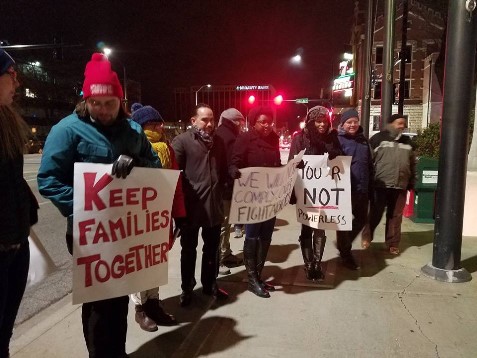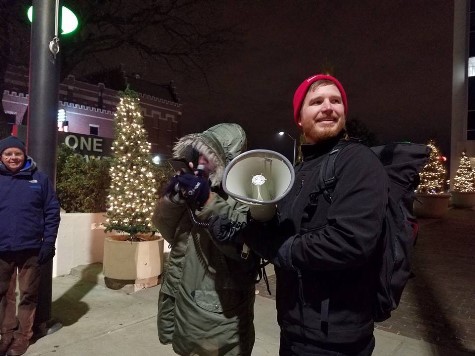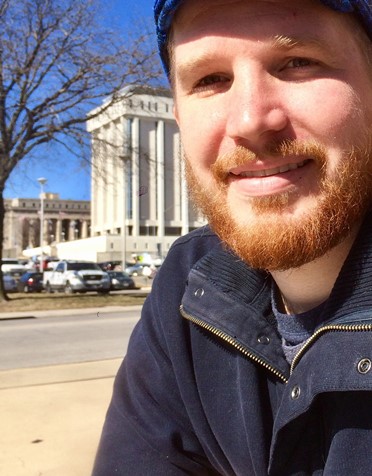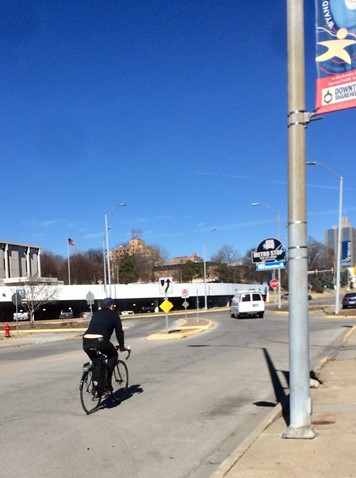
Reporting artist
Joshua Hoffman, a white man, recalls the first time he was corrected by a person of color that he became frustrated.
Hurt.
And, quite frankly, defensive.
“I was trying to help,” he says.
Hoffman, of Kansas City, Kan., had gone to a community event about an environmental issue affecting people of color. There, he thought to himself, “They’ll listen to me.” After all, he knew the best way to proceed.
So, he got up and spoke.
“I stepped in and took the mic,” he says.
But later, he got an email from a friend, a person of color from the meeting, who told him that what he had done was not the best way to help, and, in fact, had derailed the people of color telling their own stories.
Hoffman sat on his feelings for a while, before he came to realize he had made the situation about himself.
“I was putting the focus on me,” he said. “But it’s not about me.”

That was a turning point for Hoffman, who is one of the founders of the metro-wide group “Showing Up For Racial Justice-Kansas City.” The group is affiliated with the national organization of the same name. Its mission, “Through community organizing, mobilizing and education, SURJ moves white people to act as part of a multi-racial majority for justice with passion and accountability.”
“It’s about connecting with people of color to make the world better,” says Hoffman. “We need to be accountable to those affected by this.”
Being accountable means having a group of people of color oversee what SURJ does, says Hoffman.
As an example, white people wanting to help may show up to protests and start saying “I’m sorry” to people of color because they feel guilty.
“It’s not about making ourselves feel good, but to make justice happen,” he says.
He says the point is to participate in protests out of love, not guilt.
Hoffman says the protests are not the end. He says white people have a further role to play.
“We have to change the laws, the curriculum, the power in society,” he says.
And, he notes people of color have been fighting for racial justice forever.
“White people are not doing something new,” he says. “We are just showing up.”
The first local SURJ meeting was held about a year ago with around 100 people showing up. Now, the meetings run up to 300 people. The meeting is a “welcoming place,” he says, and open to everyone. The focus is on white people, and how they collude with a racist system.
“White people must become aware,” he says. “It’s the job of white people to do that.”
The meetings rotate topics, including solidarity, personal support, building local institutions and education. From these topics, other groups have emerged, such as a feminist and neighborhood groups. SURJ participated in a rally in Kansas City, Kan., in December called “Not Going Back: Wyandotte County. The protesters took an open mic, and spoke. The group also joined forces alongside the Women’s Sister March on Washington downtown on the Missouri side, among others.
Hoffman says the group does not have training, no dues, and no formal funding. When a need arises, people chip in, for example, like buying supplies to make protest posters. Those in the group also pitched in from their own pockets to send money and supplies to the Standing Rock Indian Reservation to help the protesters of the Dakota Access Pipeline. Locally, they donated to a group that provides basic supplies, like diapers, to women and children of color.
Becoming aware is a process, says Hoffman, and white people make a lot of mistakes along the way. If these mistakes are not addressed it can cause disruption, and hurt feelings.
“Being open to correction is part of that process,” he says.

Hoffman says the feeling of superiority is taught to white people. White people are supposed to be in charge. For example, a white boss is seen as successful, whereas a person of color as a boss may be questioned as legitimate.
“’White-ism’ is obsessed with control and power,” he says.
Hoffman points to his own upbringing. Hoffman grew up in rural Nebraska. He was 16, maybe 17, before he even met a person of color. He recalls as a teen hearing racist jokes, but didn’t know what they meant. Still, he began to repeat them, as a way to be part of the “in” group. Repeating the jokes made him feel “weird,” he says, but “everybody was doing it.”
Hoffman retold the jokes to feel powerful and have status. This created a category in his mind of “the other,” he says. This was reinforced with pictures in the media of black people, to the point he thought to “not be black.”
“This is totally racist,” he says.
But the “other” had already become part of his consciousness.
Hoffman says he is still in the process of un-learning and rejecting these ideas.
“It takes a lot of work,” he says.
Hoffman recalls another moment in his becoming aware. He was listening to two black DJ’s who were making fun of white people dancing or cooking. His initial reaction was “This is terrible! Isn’t this bigotry?” he asked his friend, a person of color. His friend explained that there was a big difference between bigotry and racism – that there is no shortage of prejudices, but when prejudices are combined with power — that is racism. What this means, says Hoffman, is a prejudiced boss won’t hire people of color, and landlords will not rent to people of color, as a few examples. All of this combined creates a racist system.
“That’s when I understood and the world opened up to me,” says Hoffman.
Hoffman says the SURJ meetings are filled with people of all ages, backgrounds, and incomes. Child care is also provided.
He says there’s another good reason for white people to show up.
“We get to be part of humanity–it’s not just a dream,” he says. “We get to be part of making racial equality a reality and that’s a powerful human experience.”
Rebecca Tombaugh is a reporting artist in the Kansas City area. She is a former managing editor of the Kansas City Kansan.

About Standing Up for Racial Justice
Standing Up For Racial Justice meets on the third Monday of every month from 7 p.m. to 8:30 p.m. at St. Mark Hope and Peace Church, 3800 Troost, Kansas City, Mo. Those new to the group can go to a SURJ 101 orientation at 6:30 p.m.
On Facebook: SURJ-KC
Twitter: @SURJKansasCity
For more information about the national organization go to: www.showingupforracialjustice.org
Copyright 2017 by Rebecca Tombaugh
